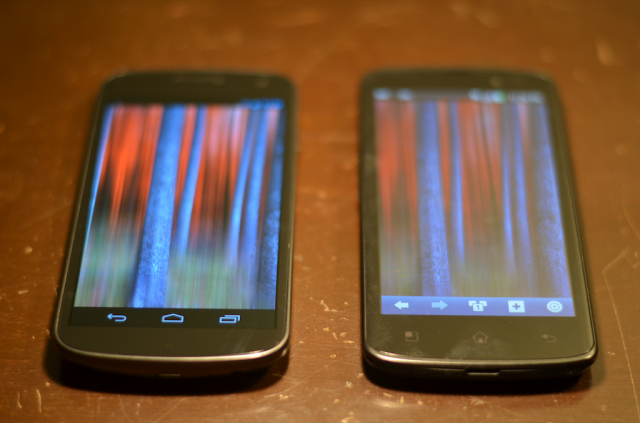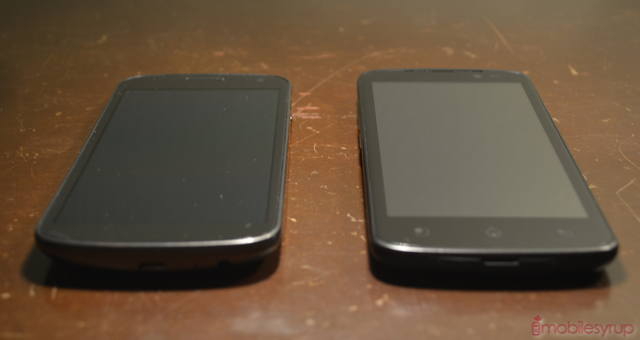
We don’t get many opportunities to compare two devices that have yet to be released in other parts of the world. The Galaxy Nexus is one of the most anticipated devices of the year, owing to its Android 4.0 software. The LG Optimus LTE is also one of the most anticipated devices of the year, owing to its HD IPS screen and screaming fast LTE connectivity.
While there is definitely a market for both, we wanted to put them head-to-head to see which one prevails. Obviously this is not a definitive test, but we’re going to give you some benchmark results as well as some screenshot comparisons. Keep in mind that in terms of hardware, the two are very similar and yet completely different.
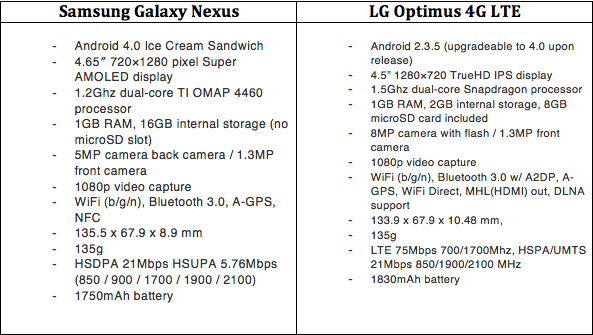
Looking at the two devices head-on, by hardware alone the LG would seem to have the leg up. Its non-PenTile IPS display, faster processor, LTE chip, higher megapixel camera and larger battery make it seem like the clear winner, but there are a few things to consider.
Benchmarks
First, let’s look at the benchmarks.

Despite the fact that the Galaxy Nexus has a processor 300Mhz slower in both cores, it is able to solidly wollip the LG in two of the four benchmark suites. It is well known that the PowerVR SGX540 GPU is quite an achiever, and more capable than the Adreno 220 inside the Optimus LTE. But when it comes to raw power, as you can see in the CF-Bench, the LG has the clear advantage.
And while it would seem sensible for the LG to beat the Nexus in a JavaScript test, the Nexus walks away with Sunspider due to its browser optimizations.
Because both phones are not running the same software, it’s hard to make a definitive statement about which one is faster — that will have to wait until the LTE gets upgraded to Android 4.0. It is safe to say that both devices are extremely fast.
Camera
Moving on to camera quality, I have devised a method to test both devices in identical circumstances. I went to Yonge and Bloor in downtown Toronto and held one device in my left hand and the other in my right. I left all settings at default and pressed the shutter at the same time. Note that because the Galaxy Nexus takes photos at 5MP and the Optimus LTE at 8MP the size of the photos are slightly different. Both are cropped to 100% to ensure comparable quality. (Click on picture to enlarge)
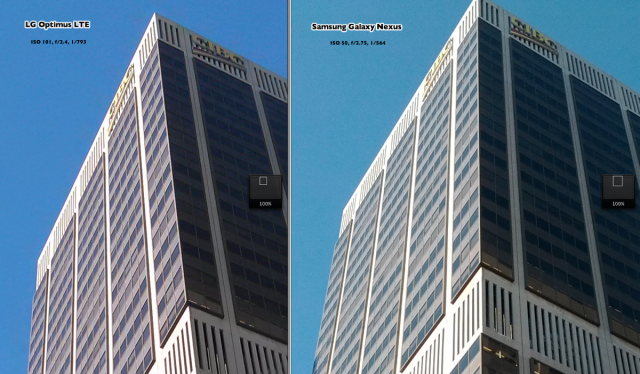
First off you can see the Galaxy Nexus has more grain in its sunny shots despite the fact it uses a lower sensitivity setting. The two photos have very different dynamic range, with the Galaxy Nexus coming out on top in terms of colour accuracy. The Galaxy Nexus, despite its low-pixel count and smaller aperture (f/2.75 to the LG’s f/2.4), captures more detail as you can by comparing the window frames on the building. Everything captured on the LG is significantly softer, likely due to a higher compression implementation: the 8MP LG shot was only 1.01MB while the 5MP Galaxy Nexus shot was 1.53MB.
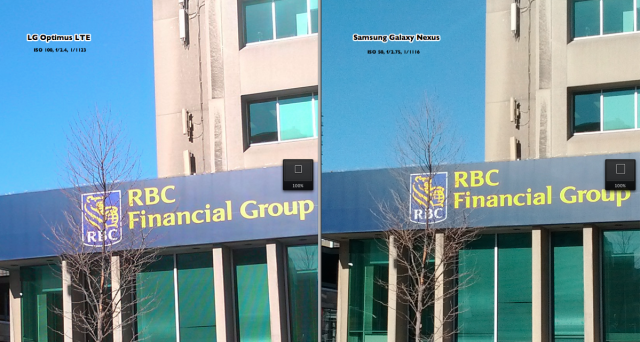 Here is another good example of the LG’s compression tainting an otherwise great shot. You can even see moiré patterns in the green curtains, likely denoting an inefficient compression alorithm taking place. Though the LG holds up better in this photo — there is plenty of great detail in the decals on the building — it suffers from slight overexposure.
Here is another good example of the LG’s compression tainting an otherwise great shot. You can even see moiré patterns in the green curtains, likely denoting an inefficient compression alorithm taking place. Though the LG holds up better in this photo — there is plenty of great detail in the decals on the building — it suffers from slight overexposure.
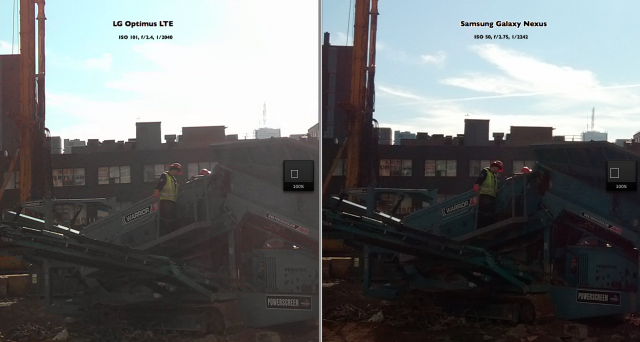 The last shot is one of the LG’s most egregious: shooting directly into the sun, the sensor doesn’t adjust the exposure accordingly, leaving a washed out mess as a result. The Galaxy Nexus, with its excellent dynamic range, picks up on the subtleties of the scene and does an excellent job balancing the light and dark areas.
The last shot is one of the LG’s most egregious: shooting directly into the sun, the sensor doesn’t adjust the exposure accordingly, leaving a washed out mess as a result. The Galaxy Nexus, with its excellent dynamic range, picks up on the subtleties of the scene and does an excellent job balancing the light and dark areas.
Now, to video. We shot the same scene with both cameras at both times. In this case the LG actually does a better job overall, despite a distracting shakiness that permeates the video. The Galaxy Nexus suffers from a fringe fisheye effect that lends the video a Matrix-like otherworldliness. However, the Galaxy Nexus also packs in much more detail.
Display
Lastly we’ll look at the display on both devices. Each one has its pros and cons: the Galaxy Nexus has better contrast and colour reproduction while the LG has more accurate white levels and brightness. Both are extremely clear. The LG does suffer from a dithering issue that we looked at in the review, but it’s a relatively minor issue that shouldn’t impede one’s use of the device.
Summing Up
Overall we’d have to give the edge to the Galaxy Nexus. Though the LG brings a lot of really great features, and true LTE speeds compared to the Galaxy Nexus’ limited 21Mbps HSPA+ connection, it falls behind in battery life and camera quality. We’d recommend going with the Optimus LTE if you want or need that extra LTE speed which, as we showed you, are pretty outstanding. Leaving behind for a minute the fact that the Galaxy Nexus boasts the newest version of Android, it is one of this year’s most well-rounded devices.
Read our two-part review of the Galaxy Nexus, and then head on over to the LG Optimus LTE review for a comparison.
MobileSyrup may earn a commission from purchases made via our links, which helps fund the journalism we provide free on our website. These links do not influence our editorial content. Support us here.

